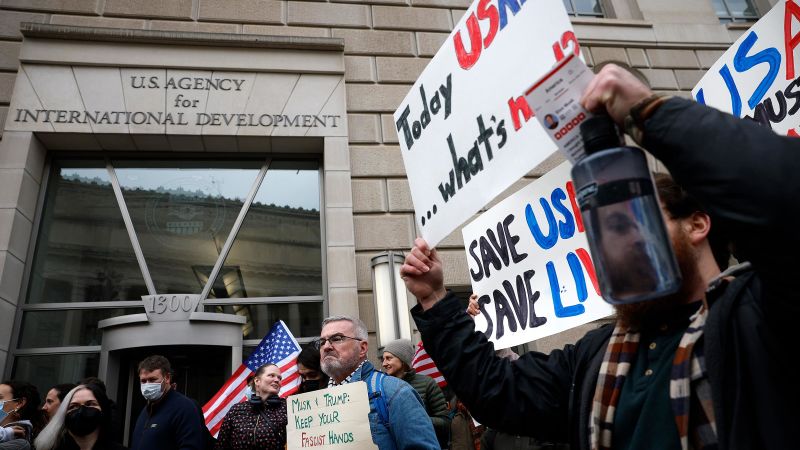Trump Administration’s USAID Cuts Spark Global Aid Crisis
Trump Administration Slashes USAID Workforce, Sparking Global Aid Crisis
The Trump administration is making sweeping cuts to the U.S. Agency for International Development (USAID), a move that could reduce its global workforce from approximately 10,000 employees to fewer than 300. The drastic downsizing is part of broader federal budget cuts, with only a small number of essential staff expected to remain. Thousands of employees, including those stationed abroad, will be placed on administrative leave starting Friday at midnight, and plans are underway to terminate contracts for non-essential workers and repatriate those stationed overseas.

A union representing USAID employees, the American Foreign Service Association (AFSA), has reported that only 294 staff members have been deemed essential under the new policy. AFSA, along with the American Federation of Government Employees (AFGE), has filed a lawsuit challenging the administration’s authority to dismantle the agency without congressional approval. The lawsuit argues that Congress is the only entity with the legal authority to shut down USAID and seeks an immediate halt to the implementation of these cutbacks. It also calls for the reopening of USAID offices, the reinstatement of grants and contracts, and the lifting of mandatory evacuation orders for staff.
The cuts have been strongly backed by Elon Musk, a key advisor to President Trump and head of the newly established Department of Government Efficiency (Doge), which is tasked with reducing federal spending. Trump’s team has criticized USAID for what they claim is inefficient use of taxpayer money and a failure to align with the administration’s “America First” policies. While polling has shown that a majority of Republicans support reducing foreign aid—an AP-NORC poll from 2023 found that 90% of Republican voters felt the U.S. was overspending—critics argue that the scale of these cuts will have dire humanitarian consequences.
Disruptions to Global Aid Efforts
USAID has historically been the world’s largest provider of humanitarian aid, with operations in more than 60 countries and partnerships in many others. The agency has played a crucial role in responding to natural disasters, public health crises, and economic development programs worldwide. Former USAID administrator Gayle Smith has warned that these cuts send a dangerous message about U.S. priorities and could undermine the country’s reputation as a reliable global partner.
“When you pull all of that out, you send some very dangerous messages,” Smith said in an interview with the BBC. “The U.S. is signaling that we don’t frankly care whether people live or die and that we’re not a reliable partner.”
The freeze on USAID funding is already being felt in many parts of the world. In Kenya, Nelson Otwoma, a leader of an NGO focused on HIV treatment, reported that layoffs caused by the funding pause have left people without access to vital medications. “We don’t know what tomorrow brings… things have ground to a halt,” Otwoma told the BBC, highlighting the fear and uncertainty gripping affected communities.
Political Fallout and Future of USAID
Reports suggest that the Trump administration may be planning to merge USAID with the State Department, with Secretary of State Marco Rubio now acting as the agency’s head. Addressing USAID workers in Guatemala, Rubio insisted that the U.S. is not abandoning foreign aid but stressed that future programs must align with national priorities.
“The United States is not walking away from foreign aid,” Rubio said. “We’re going to continue to provide assistance, but it has to be programs that we can justify, defend, and explain to the American people.”
Despite these reassurances, the cutbacks have sparked protests, with demonstrators gathering outside the U.S. Capitol holding signs reading “USAID saves lives.” Democratic lawmakers, including Congressman Raja Krishnamoorthi, have condemned the move, calling it “horrible news for global public health.” Critics argue that USAID reform is necessary but should be done in a way that preserves essential services and protects the agency’s mission.

As the legal battle over USAID’s future unfolds, thousands of aid workers face an uncertain future, and millions of people who rely on U.S. humanitarian assistance are left wondering how they will be impacted. The coming weeks will determine whether USAID’s mission continues or if this marks the beginning of a major shift in America’s role in global aid and diplomacy.
